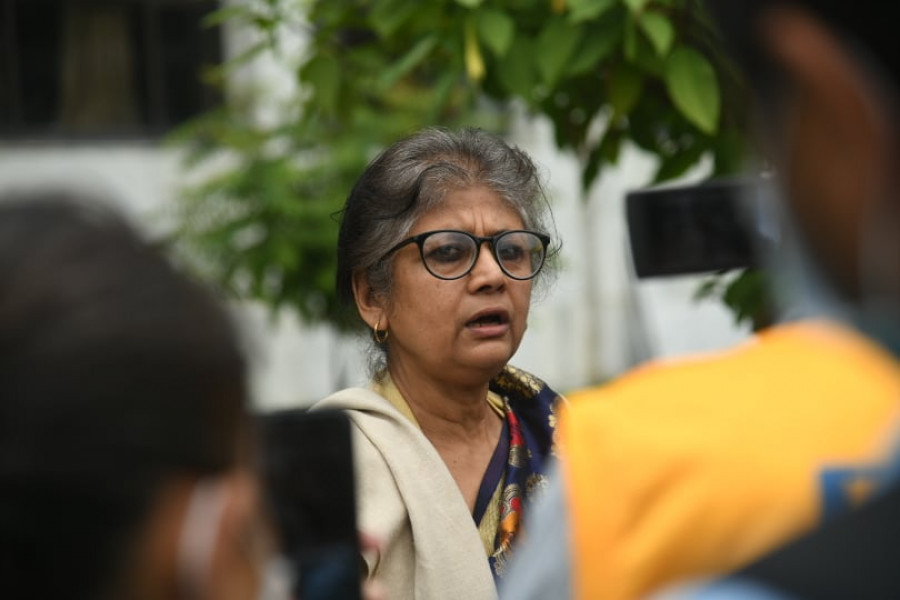Politics
Women politicians go unheard when they speak out but are ostracised if they oppose party narrative
The trials of Sarita Giri illustrate just how difficult it is for outspoken women to have a career in Nepali politics, politicians and activists say.
Aditi Aryal
Sarita Giri, on Thursday, was officially expelled from the Samajbadi Party, and consequently as a Member of Parliament, in the culmination of a series of events over the past few weeks that illustrate just how difficult it is for outspoken women in Nepali politics.
Giri had opposed the government’s constitutional amendment bill to update the map on the country’s national emblem. The new map, issued by the government in retaliation for India’s opening of a link road via the Lipulekh area, included all territories disputed with India, and had drawn unanimous support from across the political spectrum as an issue of “national sovereignty and territorial integrity”.
Giri was the lone voice in opposition, going against her party whip to register an amendment that said that Nepal had no ground to press its claims to Lipulekh, Limpiyadhura and Kalapani.
“Initially, we were supportive of her statements in Parliament, when she was only arguing against the bill,” Manushi Yami Bhattarai, a central committee member of the Samajbadi Party, told the Post. “However, when she filed an amendment to the bill without consulting the party, it came as a shock.”
According to Bhattarai, Giri’s amendment carried more weight because she was deputy chief of Samajbadi’s Parliamentary Party, and the party would’ve let her opposition go if she had just consulted the party or withdrawn the amendment. But Giri refused.
House Speaker Agni Sapkota eventually threw out the amendment, citing Clause 12 of the House of Representatives’ regulations, which states that an amendment cannot contradict the original spirit of the bill. Giri left the House and refused to take part in the vote in protest.
Giri’s expulsion as Member of Parliament is legally sound, as per the Political Parties Act.
But the ensuing condemnation of Giri combined two of Nepali politics’ most toxic elements—ultra-nationalism and misogyny, say political figures and rights activists.
“It is not uncommon for parties to threaten their members with disciplinary action for not abiding by the party whip, but these are usually just warnings. Giri’s expulsion from the House demonstrates ‘hill’ nationalism’s attempt to appease its vote bank,” Sabitri Gautam, a feminist writer, told the Post.
“This is a vivid example of how far men in the party will go to to display their masculinity and thwart their female counterparts’ careers for holding an opposing view.”
Giri is a naturalised citizen and held a proportional representation seat in Parliament under the Khas Arya portion of the women quota. These two factors played heavily into the vitriol she received in response, especially on social media. Naturalised citizens, especially those from India, are looked upon with deep suspicion by many in the Nepali political class and the general public.
This is perhaps most manifest in the debate over the Citizenship Act, say women.
Many, including ruling party politicians themselves, have argued that the act is discriminatory to women, but their voices have gone unheard. The bill to amend the Act, which has been approved by the State Affairs and Good Governance Committee, requires foreign women to wait for seven years before being eligible for naturalised citizenship. But there are no specific provisions for men, relegating them to a default 15 years minimum before they can apply for citizenship.
In the entire debate over citizenship, women politicians have rarely been consulted, and when the decision was finally taken, it was an all-male Nepal Communist Party Secretariat that took the call.
Women politicians say that most often it is women who raise women’s issues and casual sexism is visible in Parliament itself, where men dominate the sessions and rarely raise women-centric issues.
“It is as if the first few rows are exclusively reserved for men; the women always sit in back rows,” said Chhaya Sharma Pant, a Central Committee member of the Samajbadi Party. “As women we have to put in extra effort to have our voices heard, since the primary leadership positions are held by men.”
When women speak out, they are rarely listened to, but when they go against the grain, especially on issues that are deemed to be of “national importance”, they are thoroughly castigated.
The National Human Rights Commission, on Thursday, issued a statement condemning the actions of Mohna Ansari, one of its commissioners. All Ansari had done was tweet in support of Giri’s freedom of expression on Tuesday.
Like Giri, Ansari too is a woman from a marginalised community, and she has often become a lightning rod for nationalists and misogynists for her outspoken views.
“I was only speaking for a Member of Parliament who had voiced her concerns openly. Her party denied her the opportunity to defend herself and made a unilateral decision,” Ansari told the Post. “That said, my Twitter handle is my personal account and it does not represent the commission’s views.”
Giri’s expulsion and Ansari’s condemnation shed light on the fact that politics continues to be male-dominated.
None of the political parties has ensured 33 percent representation of women in their central committees, said Bhattarai, and there are only three women in Oli’s 22-member Cabinet.
In 2016, three key positions in the state—the President, House Speaker, and chief justice—were occupied by women. But since then, the playing field has never been as level.
Women continue to be sidelined to make way for males and have their presence reduced to mere tokenism.
“The general lens through which women are viewed in society is sexist and male party members view us in the same manner,” Binda Pandey, a central committee member of the Nepal Communist Party (NCP), told the Post.
“During protests and movements, women are treated as equals and given hopes about inclusion and empowerment, but soon after, a hierarchy, where women are placed in subordinate positions, manifests. Men are just not willing to trust women in decision-making positions.”
Prakriti Bhattarai Basnet, chairperson of Political Literacy for Women, a digital platform that aims to educate Nepali women about politics, attributes this bias to the fact that major political parties are not committed to the principle of inclusion, but have rather been driven to inclusion because of legal and constitutional obligations.
“The inability of women parliamentarians to form a women’s caucus in Parliament also shows how difficult it is for women to raise their voices in the legislature,” Basnet said. “And the absence of women in the central committees of the political parties shows how inclusion is just for show, nothing else.”
For the few women who are represented in party structures, like Bhattarai, Pant, and Pandey, speaking out often comes with consequences, as Giri’s experience shows. Women politicians are more prone to online abuse that is misogynistic and sexist.
“I have received a lot of comments asking me to quit politics and have kids instead, and to also remain in the kitchen where women apparently belong,” Ranju Darshana, a central committee member of the Bibeksheel Nepali party, told the Post. “Almost all of these comments and messages are sent by men and are often of the sexual nature.”
These challenges aside, women in politics continue to fight their battles, hoping for an easier tomorrow for the generations to come.
“We’re all legally equal but the challenge remains to be treated as equals socially and culturally,” said Pandey. “I try to brave through these challenges today so that it is easier for the next generation to take over as political leaders of the country.”




 22°C Kathmandu
22°C Kathmandu















